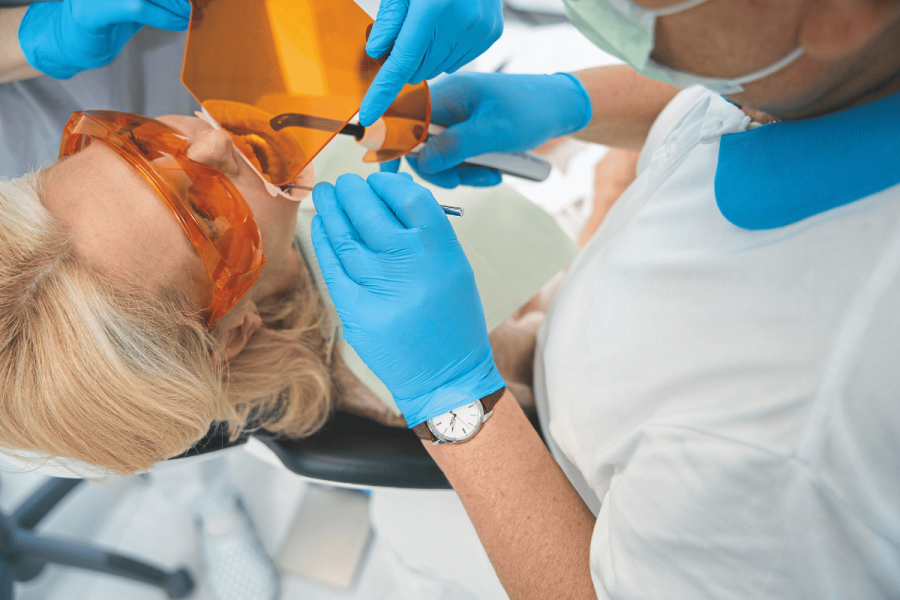The health of your mouth can be intrinsically linked to what’s happening systemically throughout your body. To coincide with National Smile Month (May 12 – June 12) we look at root canal treatment and why it might not be something to smile about.
Words: Angela Kennedy. Images: Shutterstock
It’s easy to take the health of your pearly whites for granted – until something goes wrong. Then, the thought of a drill and fill trip to the dentist is enough to strike fear into anyone. One tooth mishap is infection of the soft tissue inside tooth enamel, caused by faulty fillings, cracks or decay. Treatment is known as root canal – or more officially an endodontic procedure – and aims to remove infected pulp to preserve your tooth.
‘The root canal system is the innermost layer of the tooth, called dental pulp. It contains the nerve and blood supply, providing sensation and nutrients to teeth,’ says Dr Shakil Umerji, endodontics specialist at PortmanDentex (portmandentex.com). It’s a fairly common procedure, with a third of adults reporting having root canal treatment in a recent government survey. One million root canal treatments are performed by the NHS each year, costing about £50 million.
Signs you might have an infected tooth include swelling, toothache or sensitivity to hot and cold. Diagnosis is usually via an X-ray and symptoms are not something you should ignore. ‘Your tooth can turn black and you may get an abscess and pain – ultimately you may lose the tooth,’ says Dr Richard Marques (doctorrichardlondon.com). Leaving an infected tooth untreated for a long time can even potentially lead to life-threatening sepsis.
During the treatment, the root canal space is cleaned out with disinfectants and sterile metal brushes to remove bacteria and infected pulp. Then the space is filled to prevent reinfection. The British Endodontics Society says root canal has a success rate of up to 90 per cent if carried out to a good standard. However, root canal doesn’t always work. ‘A tooth may be too infected, too broken down (fractured) or the procedure may have been performed to a suboptimal standard. Or inadequate fillings or crowns, further cracks or decay can lead to bacteria reinfecting the root,’ says Dr Shakil Umerji.
Thinking holistically
Although root canal is the recommended treatment, not everyone agrees it’s the best choice for your health. ‘Personally, I would never opt for a root canal procedure, nor would I recommend it for my family. The idea of leaving a dead organ inside the body goes against fundamental biological principles, as it has the potential to become a source of chronic infection or inflammation,’ says Dr Richard Pollock (drpollock.co.uk) who combines traditional restorative dentistry with a holistic understanding of health. ‘From experience, I have seen people with a compromised immune system—whether they are aware of it or not— who can be particularly affected by root canal-treated teeth. These teeth essentially become foreign bodies that may trigger a continuous immune response, placing additional strain on an already burdened system,’ he says.
In theory, Dr Pollock agrees with the general consensus that preserving your natural tooth is preferable – but only if the tooth is healthy. ‘While mainstream dentistry insists root canals are the best solution for treating infected teeth, I remain unconvinced. A dead or severely infected tooth, even if root-treated, is no longer functioning as a living part of the body and can become a hidden source of systemic health issues. In holistic dentistry, the preferred alternative is the removal of the dead tooth, followed by thorough bone cleaning to eliminate residual infection.
This includes ozone therapy to disinfect the area at a microbial level, so the bone is as free of pathogens as possible. The socket is then filled with platelet-rich fibrin, derived from the patient’s blood, to promote natural healing, stimulate bone regeneration and reduce risk of cavitations,’ he adds. A follow-up of nutrients via oral supplements to aid bone formation, immune function and healing, such as vitamin D3, magnesium, boron and omega-3 fatty acids, are then recommended – treating your body as a whole to aid natural regenerative processes in the mouth.
Read: What your teeth reveal about your health

Making a connection
Indeed, the mouth-body connection is central to biological dentistry – also called holistic or natural dentistry. It’s the idea that what happens in your mouth, such as bacterial infection, can impact the rest of your body. ‘Your oral health is fundamentally connected to your overall health and wellbeing. Teeth help you function, eat and look pleasing to the eye, but that’s only the beginning. The interconnectedness between everything in your body is why oral health should be seen holistically,’ says Dr Sebastien Lomas, biochemist and biological dentist specialising the oral microbiome and minimally invasive dentistry (wonderofwellness.co.uk).
‘No procedure can fully sterilise a dead tooth, potentially leaving behind harmful pathogens. Research links root canals to heart disease, autoimmune conditions, and other health issues due to inflammation from residual bacteria. A study found more than 40 per cent of root canal-treated teeth show undetected infection on 3D CBCT scans, even if the patient has no symptoms,’ he says.
Another study indicated that bacteria from root canal-treated teeth can stimulate pro-inflammatory cytokines, which are thought to play a role in triggering immune disorders. The cytokines declined significantly 3-8 months after extraction of the corresponding teeth. Dr Bita Fox a holistic dentist, specialising in restorative dentistry, who also has decades of expertise in general dentistry (weybridgebiodentist.co.uk), agrees: ‘Chronic infection, which many root canal-treated teeth can host, can wreak havoc on your immune system, doing harm on a low grade level but on a continuous basis. So, your immune system may not be able to fight other bacteria or viruses optimally.’
Taking the right action
Of course, holistic treatments are strongly questioned by traditional dentistry. ‘There is no evidence to prove a cause-and-effect relationship between root canal treated teeth and systemic diseases. You’d treat a cut on your arm by cleaning the wound and sealing it with a plaster to allow the body to heal. Root canal treatment works in a similar way. Extracting a tooth would be akin to amputating your arm to treat a cut. It should be the last resort,’ says Dr Shakil Umerji.
Alternatives to root canal that preserve your tooth include pulp capping, which works if inflammation or low-grade infection is found, with naturally antimicrobial ozone gas used to kill bacteria deep inside the enamel. ‘Too many times a tooth is deemed “failed” and a root canal treatment is prescribed.
In my experience, so long as the tooth hasn’t died and is responsive to cold or hot for instance, it stands a chance to survive without a root canal treatment or extraction. If the tooth can be saved, we use a regenerative technique of cleaning the tooth carefully to avoid traumatising the nerve, stopping just before the nerve tissue,’ explains Dr Fox. ‘Then we ozonate the tiny bit of affected dentine left behind to kill the bacteria. Next, we put a calcium-based material over the top to stimulate nerve cells to produce healthy dentine (tooth tissue), and as a barrier to future bacterial growth.’
While root canal remains a standard treatment, thinking of the mouth and body as interconnected with each affecting the health of the other makes sense – just as the brain-gut connection links digestion and mood. Treating oral health holistically with a focus on restoration and prevention sounds sensible – whatever the tooth of the matter!

How can I improve my oral hygiene?
Tip 1: Use the correct brushing technique
“For good dental hygiene I would advise educating yourself by watching some tutorial videos on the correct technique. Many people are not aware that there are different techniques to be utilised depending on whether you are using a manual, electric or sonic toothbrush,” says Theodora Little, consultant hygienist for Swiss dental care brand CURAPROX UK.
Tip 2: Brush your teeth for longer
Many of us also do not brush for long enough. Little explains: “The general guidelines are brushing for 2 minutes twice a day, however for many people this is not long enough and 3-4 minutes is optimal. So, practice your new daily routine by using a timer daily set to 2 minutes and split your mouth into 4 sections in which you spend 30 seconds on each section.
“After completing, run your tongue around your teeth and if you still feel a slight ‘roughness’ or ‘furriness’ then it may mean you need to adapt your technique or brush for another minute or so.”
Tip 3: Use interdental brushes
Many people often skip interdental cleaning due to a lack of time. However, it’s crucial for dental hygiene. Little explains: ‘Taking the time even once a day to install this habit can improve your oral health.
“Interdental brushes are nowadays usually recommended as they can be more effective, easier and quicker, however it is important that the right size is used. Some people may only be able to use floss, and again this habit can be implemented with the time we now have.
“As a dental professional, I would also recommend a dental professional demonstrating and educating particular techniques to patients. Alternatively, you can watch a helpful tutorial video here.”
Find more tips on how to improve your oral hygiene here.







